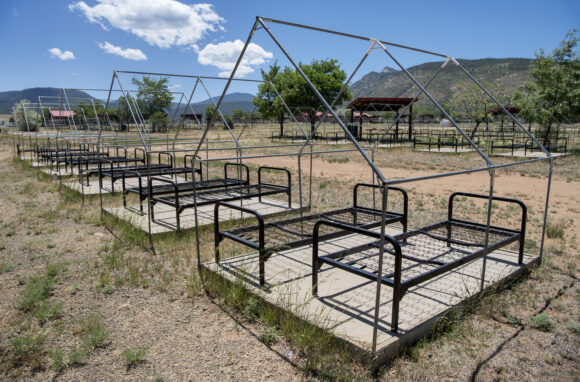DOVER, Del. (AP) — The Boy Scouts of America submitted a bankruptcy reorganization plan Monday that envisions continued operations of its local troops and national adventure camps but leaves many unanswered questions about how it will resolve tens of thousands of sexual abuse claims by former Boy Scouts
The plan was filed Monday in Delaware bankruptcy court, even though the BSA remains in intense negotiations with insurers who face substantial exposure for sexual abuse claims, and with the official committee representing abuse victims.
The plan calls for a $300 million contribution from the Boy Scouts’ 250-odd local councils into a trust for abuse victims, although the form and timing of those contributions remain up in the air. The Boy Scouts also say any unrestricted cash above the $75 million the organization claims it will need for operations when it emerges from bankruptcy will go into the trust fund. The BSA also has agreed to contribute its collection of Norman Rockwell paintings to the fund, and to sell a warehouse facility in North Carolina, a Scouting University facility in Texas, and rights to oil and gas interests on properties in 17 states.
“The plan demonstrates that considerable progress has been made as we continue to work with all parties toward achieving our strategy to provide equitable compensation for victims and address our other financial obligations so that we can continue to serve youth for years to come,” the Boy Scouts said in a prepared statement.
“In the coming months, supplements to the plan will include a more detailed breakdown of the process to compensate survivors and more details about how local councils will support this effort,” the statement adds.
Paul Mones, an attorney representing hundreds of former Scouts, called the plan “woefully and tragically inadequate.”
“The problem is that the Boy Scouts are not willing to dig deep enough for the deep pain they caused,” he said.
“They are shifting the responsibility to the insurance companies, creating a situation for the survivors to engage in obviously protracted litigation to obtain the just compensation they deserve,” Mones added. “The BSA basically wants to walk away unscathed from this.”
The Boy Scouts of America, based in Irving, Texas, sought bankruptcy protection last February in an effort to halt hundreds of individual lawsuits and create a compensation fund for men who were molested as youngsters decades ago by scoutmasters or other leaders.
The councils, which run day-to-day operations for local troops, are not listed as debtors in the bankruptcy and are considered by the Boy Scouts to be legally separate entities, even though they share insurance policies and are considered “related parties” in the bankruptcy case.
Attorneys for abuse victims made it clear from the onset of the bankruptcy that they would go after campsites and other properties and assets owned by councils to contribute to a settlement fund.
“I think the Boy Scouts have a responsibility here to make sure those men are taken care of,” Mones said.
The plan does not reflect any agreements with BSA insurers or estimates of their potential liabilities but does state that the rights to policies and insurance proceeds would go into the trust.
Lawyers for the BSA’s insurance companies have argued that they should be allowed to serve document requests on 1,400 people who have filed sexual abuse claims and to question scores of them under oath in an effort to determine whether there has been widespread fraud in the claims process. The judge has yet to rule on that request.
Tancred Schiavoni, an attorney for one of the BSA insurers, Century Indemnity, said Monday that his client supports a fair resolution for abuse victims, “but this plan doesn’t get us there.”
“The court needs to first implement a process to root out the bad claims generated by for-profit claims aggregators and misleading advertising campaigns,” Schiavoni said in a prepared statement.
More than 95,000 sexual abuse claims have been filed in the bankruptcy case.
Before the bankruptcy filing, the BSA had been named in about 275 lawsuits and told insurers it was aware of another 1,400 claims. The number of lawsuits has more than tripled in the past year to roughly 860 case in more than 110 state and federal courts. Some 600 of the lawsuits were filed after the Boy Scouts asked the bankruptcy judge for a preliminary injunction halting lawsuits against local councils and sponsoring organizations.
Attorneys for the Boy Scouts are continuing to try to resolve disputes with the official tort claimants committee over the amount of BSA and local council assets that might be available for abuse victims.
The committee has complained about a lack cooperation by local councils in response to its requests for information about their financial assets. The committee also filed an adversary action in the bankruptcy case in January challenging BSA’s contention that two-thirds of its listed $1 billion in assets, more than $667 million, are “restricted” and unavailable for creditors.
More than half of the purportedly restricted assets, $345.4 million, consists of a note receivable from Arrow WV, a nonprofit entity that was formed by the BSA in 2009 and which owns the Summit Bechtel Reserve in West Virginia, home to the National Scout Jamboree. The BSA leases the Summit from Arrow WV and provides the services required for its operation. Other purportedly restricted assets include three “High Adventure” facilities valued at more than $63 million. They are the Philmont Scout Ranch in New Mexico, the Northern Tier in Minnesota and the Florida Sea Base.
The tort claimants committee contends that there is no restriction that could be applied to the Arrow WV note, and that there are no specific deed restrictions or donor restrictions that preclude the sale of the High Adventure facilities and use of the proceeds to pay creditors.
Meanwhile, a court-appointed panel of mediators submitted a court filing Monday night indicating that the Boy Scouts have reached settlements with the official committee of unsecured creditors and with JPMorgan Chase, the organization’s senior secured lender.
The BSA has agreed to set aside $25 million to pay non-abuse general unsecured claims. JPMorgan, which holds allowed claims of more than $328 million, has agreed to extend the maturity on its debt to 10 years after the effective date of the bankruptcy plan. It also has agreed to forego principal and interest payments until two years after the effective date.
About the photo: In a Wednesday June 10, 2020 photo, hundreds of tent pads remain empty where normally thousands of Boy Scouts would be arriving at and departing Philmont Scout Ranch in Colfax County, New Mexico. On June 4, the camp announced all 2020 summer programs would be canceled. (Eddie Moore/Albuquerque Journal)/The Albuquerque Journal via AP)
Was this article valuable?
Here are more articles you may enjoy.


 California Chiropractor Sentenced to 54 Years for $150M Workers’ Comp Scheme
California Chiropractor Sentenced to 54 Years for $150M Workers’ Comp Scheme  Report: Claims Handlers Embracing Technology
Report: Claims Handlers Embracing Technology  UnitedHealth Data Leak May Affect ‘Substantial’ Swath of U.S.
UnitedHealth Data Leak May Affect ‘Substantial’ Swath of U.S.  EVs Head for Junkyard as Mechanic Shortage Inflates Repair Costs
EVs Head for Junkyard as Mechanic Shortage Inflates Repair Costs 